We will stay firmly rooted in Chinese culture. We will collect and refine the defining symbols and best elements of Chinese culture and showcase them to the world. We will accelerate the development of China’s discourse and narrative systems, better tell China’s stories, make China’s voice heard, and present a China that is credible, appealing, and respectable.
習近平抵達阿斯塔納出席上海合作組織成員國元首理事會第二十四次會議
並對哈薩克進行國事訪問
發佈時間:2024-07-03 08:38:26 | 來源:新華社 | 作者: | 責任編輯:丁素雲新華社阿斯塔納7月2日電(記者楊依軍 馬崢)當地時間7月2日中午,國家主席習近平乘專機抵達阿斯塔納,出席上海合作組織成員國元首理事會第二十四次會議,應哈薩克共和國總統托卡耶夫邀請,對哈薩克進行國事訪問。
習近平乘坐的專機進入哈薩克領空後,哈薩克三架空軍戰機升空護航。
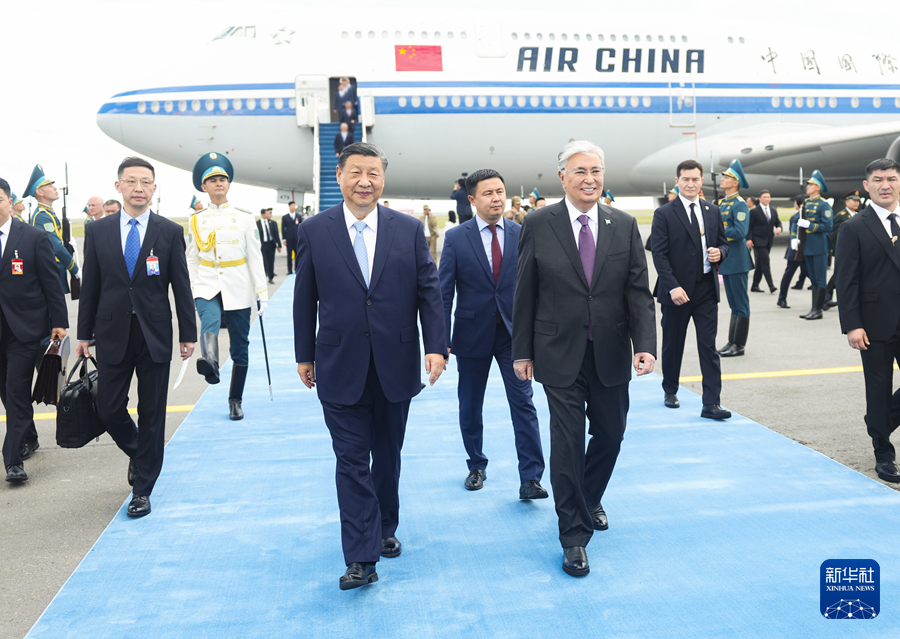
當地時間7月2日中午,國家主席習近平乘專機抵達阿斯塔納,出席上海合作組織成員國元首理事會第二十四次會議,應哈薩克共和國總統托卡耶夫邀請,對哈薩克進行國事訪問。習近平主席專機抵達阿斯塔納納扎爾巴耶夫國際機場時,哈薩克總統托卡耶夫率政府高級官員熱情迎接。新華社記者 鞠鵬 攝
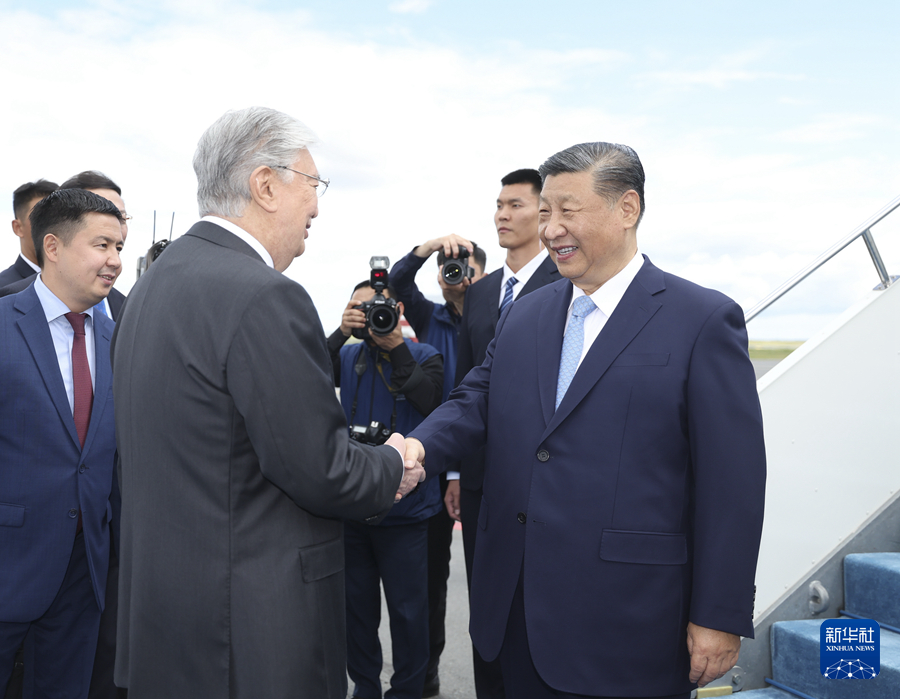
當地時間7月2日中午,國家主席習近平乘專機抵達阿斯塔納,出席上海合作組織成員國元首理事會第二十四次會議,應哈薩克共和國總統托卡耶夫邀請,對哈薩克進行國事訪問。習近平主席專機抵達阿斯塔納納扎爾巴耶夫國際機場時,哈薩克總統托卡耶夫率政府高級官員熱情迎接。新華社記者 鞠鵬 攝
專機抵達阿斯塔納納扎爾巴耶夫國際機場時,哈薩克總統托卡耶夫率政府第一副總理斯克利亞爾、副總理兼外長努爾特列烏、總統外事顧問卡濟漢、阿斯塔納市長卡瑟姆別克等高級官員熱情迎接。身著盛裝的哈薩克女青年向習近平獻花。
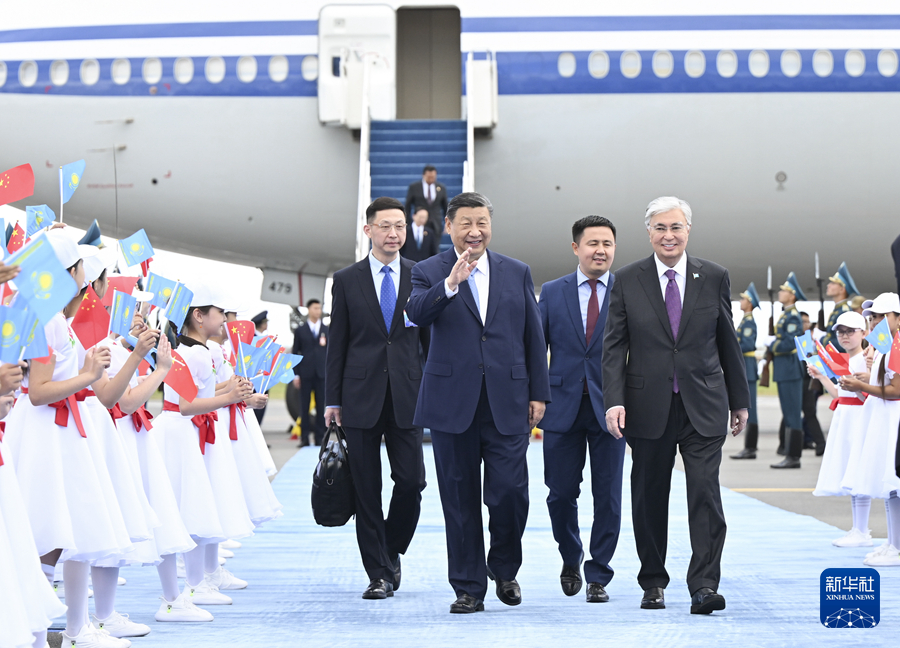
當地時間7月2日中午,國家主席習近平乘專機抵達阿斯塔納,出席上海合作組織成員國元首理事會第二十四次會議,應哈薩克共和國總統托卡耶夫邀請,對哈薩克進行國事訪問。托卡耶夫在機場為習近平舉行盛大隆重的迎賓儀式。新華社記者 謝環馳 攝
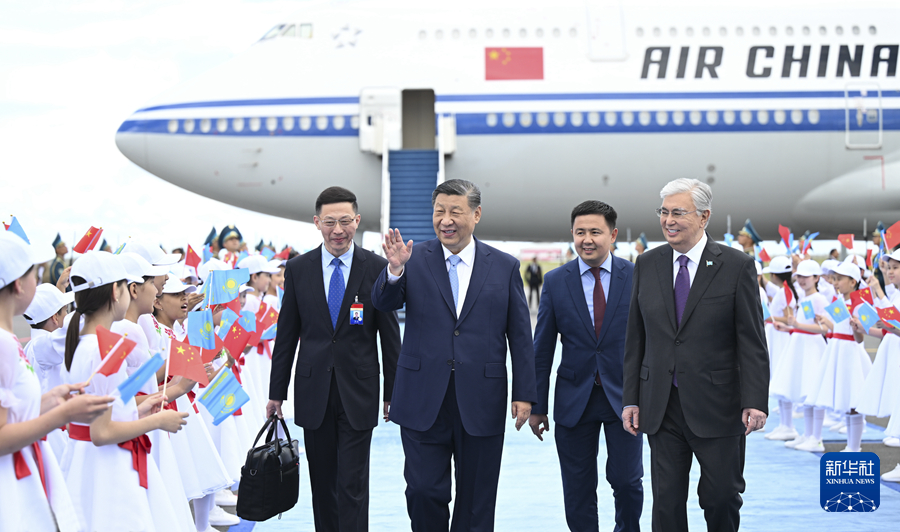
當地時間7月2日中午,國家主席習近平乘專機抵達阿斯塔納,出席上海合作組織成員國元首理事會第二十四次會議,應哈薩克共和國總統托卡耶夫邀請,對哈薩克進行國事訪問。托卡耶夫在機場為習近平舉行盛大隆重的迎賓儀式。新華社記者 謝環馳 攝
托卡耶夫在機場為習近平舉行盛大隆重的迎賓儀式。100余名儀仗兵英姿挺拔,軍樂團奏響迎賓曲和迎賓號角。近百名哈薩克兒童揮舞中哈兩國國旗,歡呼“您好”,熱烈歡迎習近平到訪。
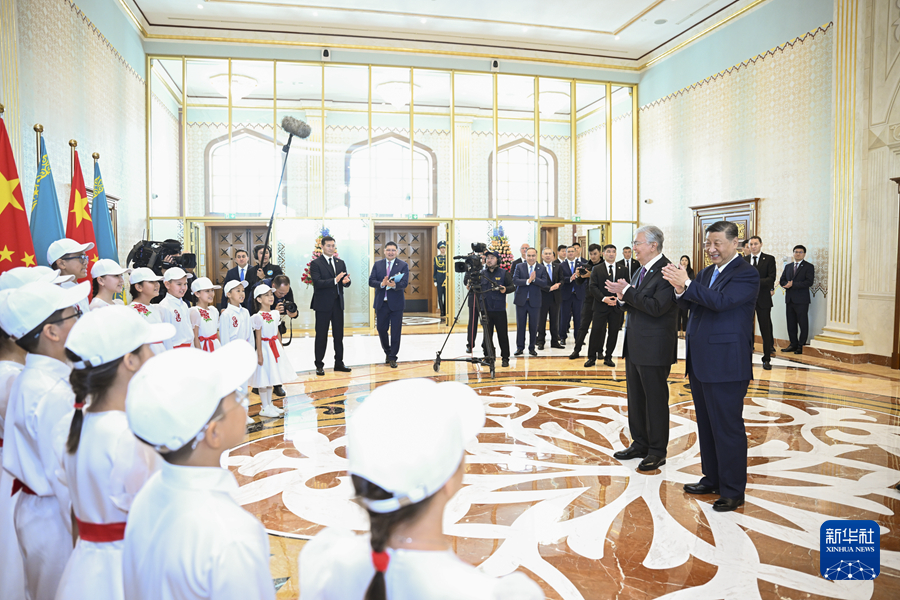
當地時間7月2日中午,國家主席習近平乘專機抵達阿斯塔納,出席上海合作組織成員國元首理事會第二十四次會議,應哈薩克共和國總統托卡耶夫邀請,對哈薩克進行國事訪問。托卡耶夫在機場為習近平舉行盛大隆重的迎賓儀式,十余名哈薩克少年兒童用中文演唱《歌唱祖國》。新華社記者 謝環馳 攝
習近平在托卡耶夫陪同下檢閱儀仗隊。十余名哈薩克少年兒童用中文演唱《歌唱祖國》。
習近平發表機場書面講話,代表中國政府和中國人民,向友好的哈薩克人民致以誠摯問候和良好祝願。
習近平指出,中哈友好源遠流長。兩國建交32年來,中哈關係經受住時代變遷和國際風雲變幻的考驗,結為獨一無二的永久全面戰略夥伴關係,樹立了鄰國和衷共濟、互利共贏、相互成就的關係典範。11年前,我在哈薩克首次提出共建“絲綢之路經濟帶”倡議。如今,中哈共建“一帶一路”碩果纍纍。我期待同托卡耶夫總統就中哈關係以及共同關心的國際和地區問題深入交換意見,為中哈永久全面戰略夥伴關係發展擘畫新藍圖、作出新部署。我也期待出席上海合作組織阿斯塔納峰會,同各方一道共話組織未來,共商合作大計,推動這一重要多邊機制實現新的更大發展。
蔡奇、王毅等陪同人員同機抵達。
中國駐哈薩克大使張霄也到機場迎接。
習近平乘車從機場赴下榻飯店途中,當地中資企業代表等候在道路兩旁,揮舞中哈兩國國旗,高舉“熱烈歡迎習近平主席訪問哈薩克”等紅色橫幅,熱烈歡迎習近平主席到訪。
Xi arrives in Kazakhstan for state visit, SCO summit with focus on bolstering cooperation
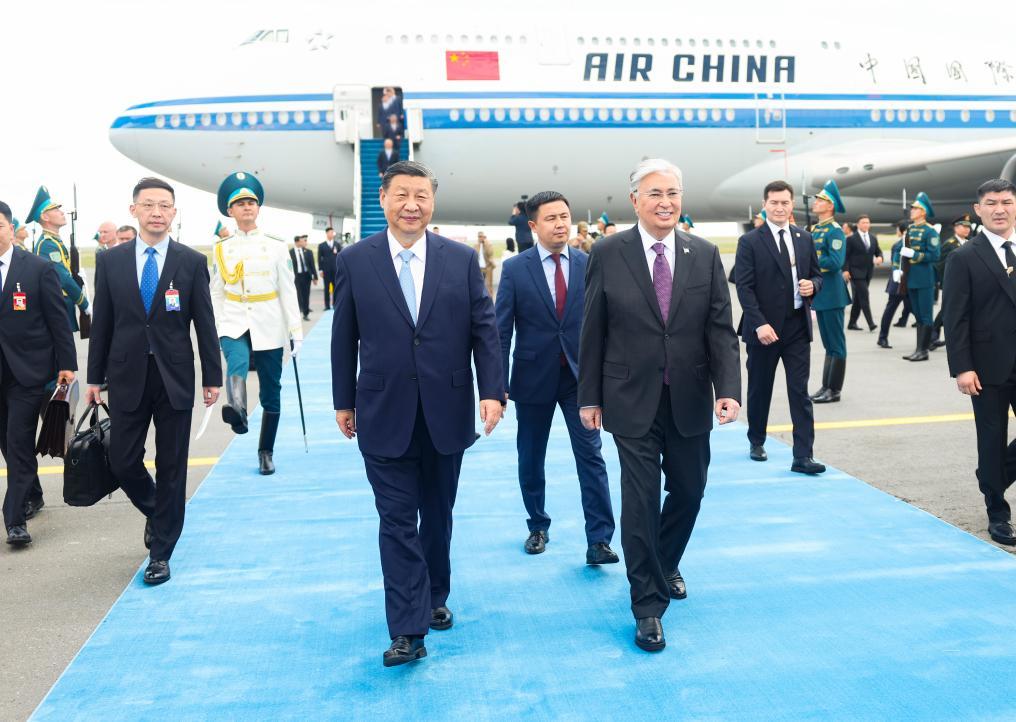
Chinese President Xi Jinping arrives in Astana, Kazakhstan, July 2, 2024, for the 24th Meeting of the Council of Heads of State of the Shanghai Cooperation Organization, and a state visit to Kazakhstan at the invitation of Kazakh President Kassym-Jomart Tokayev. Xi was warmly welcomed by Tokayev and a group of Kazakhstan senior officials upon his arrival at the airport. (Xinhua/Ju Peng)
ASTANA, July 2 (Xinhua) -- Chinese President Xi Jinping arrived in Kazakhstan on Tuesday for a state visit and to attend the 24th Meeting of the Council of Heads of State of the Shanghai Cooperation Organization.
This is Xi's fifth visit to Kazakhstan and the second one in less than two years, following his previous state visit in September 2022. The visit this time is expected to bring a renewed focus on the multifaceted aspects of bilateral ties and cooperation.
Calling the China-Kazakhstan partnership "unique," Xi said upon his arrival here that the everlasting friendship of the two nations has grown stronger over time, and set an example of solidarity, mutual benefit, and mutual success between neighboring countries.
In a series of meetings scheduled with Kazakh President Kassym-Jomart Tokayev, Xi is expected to engage in detailed discussions aimed at further strengthening cooperation between the two nations. The focal points of these talks are expected to cover trade and investment, infrastructure development, and cultural and people-to-people exchanges.
"The leaders of our countries launched a new 'golden 30 years' of cooperation between Kazakhstan and China," said Gulnar Shaimergenova, director of Kazakhstan's China Studies Center, referring to a joint announcement by the two heads of state during Xi's visit in 2022.
With Kazakhstan-China relations growing at a high level, it is believed that Xi's visit to Kazakhstan will open up new prospects for bilateral cooperation, she said.
During Tokayev's visit to China in 2019, the two countries decided to elevate their ties to a permanent comprehensive strategic partnership. Speaking at a daily briefing in Beijing on Monday, a Chinese Foreign Ministry spokesperson said that it is expected that Xi's visit this time will further strengthen bilateral relations.
The deepening mutual trust and political ties between China and Kazakhstan have been accompanied by a remarkable growth in their trade and economic cooperation over the past three decades.
China was Kazakhstan's largest trading partner in 2023, with two-way trade up by 32 percent year-on-year to reach 41 billion U.S. dollars. Key exports from Kazakhstan to China include crude oil, metals, and agricultural products, and in turn China has supplied Kazakhstan with machinery, electronics, and consumer goods, according to Kazakh government data.
The Central Asian nation has also become a critical partner in the China-proposed Belt and Road Initiative (BRI), which aims to boost connectivity and promote global prosperity through infrastructure development and trade and investment facilitation. It was in Kazakhstan in 2013 that Xi first proposed the initiative of the Silk Road Economic Belt.
"This marked a magnificent chapter in Belt and Road cooperation between our two countries. And the development of China-Kazakhstan relations has since entered a new stage," Xi said in a signed article in the Kazakhstanskaya Pravda newspaper and Kazinform International News Agency on Tuesday.
Since then, the two countries have made significant strides in enhancing connectivity and economic integration through various BRI projects.
Among the recently completed and commissioned ventures are the Zhanatas wind farm, the Turgusun hydropower station, and the modernization of the Shymkent Oil Refinery. These developments underscore the robust energy cooperation fueling both countries' development. The China-Kazakhstan crude oil and natural gas pipelines are also operating with remarkable stability and safety, ensuring a consistent energy supply vital for both economies.
This dynamic partnership has also extended into transportation infrastructure, with key transport and logistics hubs, such as the terminal in Xi'an, the Western Europe-Western China Highway, and the China-Europe Railway Express, functioning seamlessly.
BRI's support for cross-border transport infrastructure has benefited Kazakh connectivity, according to a World Bank report, entitled "South Caucasus and Central Asia: The Belt and Road Initiative Kazakhstan Country Case Study."
For more than a decade, Kazakhstan has invested substantially to improve its own transport network, but due to more limited improvements in trade facilitation and limitations of resources in many neighboring countries, the gaps have been difficult to fill.
The focus of BRI on expanding transport infrastructure and economic integration and China's drive to connect its western and central regions more effectively to Europe and to West Asia provide an opportunity to address these gaps, according to the World Bank report.
"Kazakhstan is likely to be among the larger beneficiaries of the BRI," it concluded.
Meanwhile, consensus on deepening cultural and people-to-people exchanges is expected to be reached during Xi's visit. Both nations have for long recognized the importance of fostering greater understanding and friendship between their peoples, viewing cultural exchanges as one major cornerstone of their bilateral relationship.
So far, a China-Kazakhstan agreement on mutual establishment of cultural centers has been signed. Chinese and Kazakh filmmakers have co-produced a film entitled "The Composer," which is their first co-production. Bilateral programs for cultural cooperation, including a Chinese university campus in Kazakhstan, a Luban Workshop, and a center of traditional Chinese medicine, have been implemented.
Thanks to the mutual visa-exemption arrangements, a total of 600,000 cross-border trips were recorded in 2023. In the first quarter of this year, the number of visits in both directions amounted to 200,000 and are expected to reach a new high, official data from both sides have shown.
In an exclusive written interview with Xinhua before Xi arrived here, Tokayev emphasized the significance of cultural and people-to-people communications between the two countries, as the opening ceremony of the "Kazakhstan Tourism Year" in China was held in March in Beijing.
"Cultural and people-to-people cooperation plays an important role in strengthening bilateral ties and fostering friendship between the peoples of our countries," he said. ■
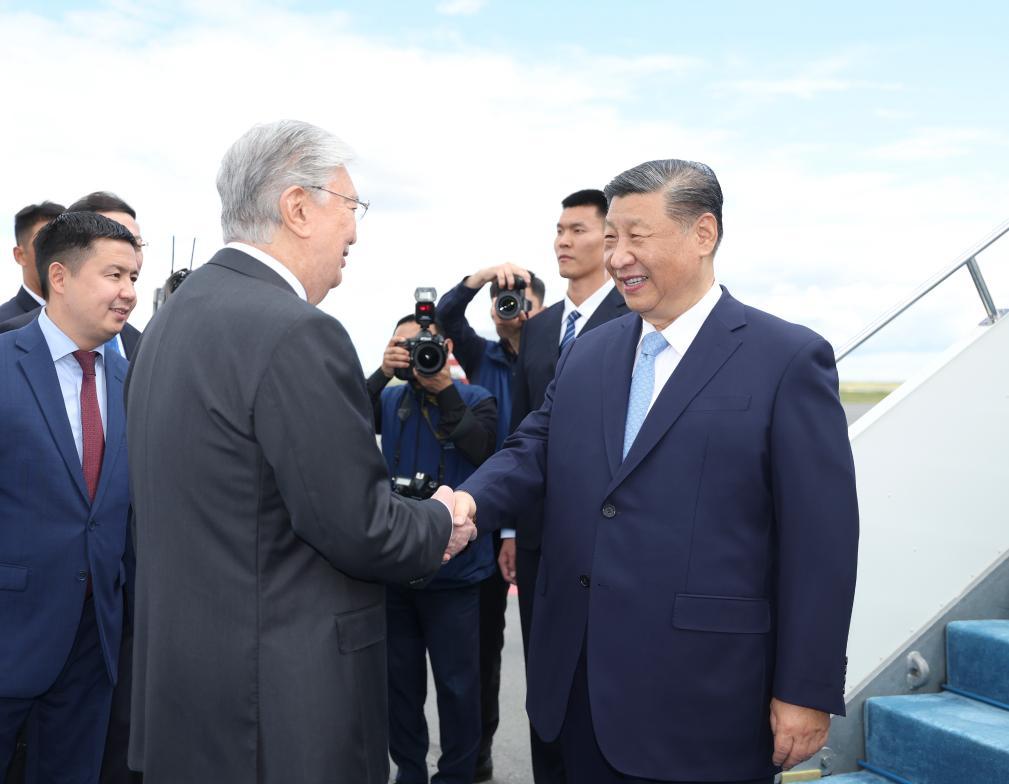
Chinese President Xi Jinping arrives in Astana, Kazakhstan, July 2, 2024, for the 24th Meeting of the Council of Heads of State of the Shanghai Cooperation Organization, and a state visit to Kazakhstan at the invitation of Kazakh President Kassym-Jomart Tokayev. Xi was warmly welcomed by Tokayev and a group of Kazakhstan senior officials upon his arrival at the airport. (Xinhua/Ju Peng)
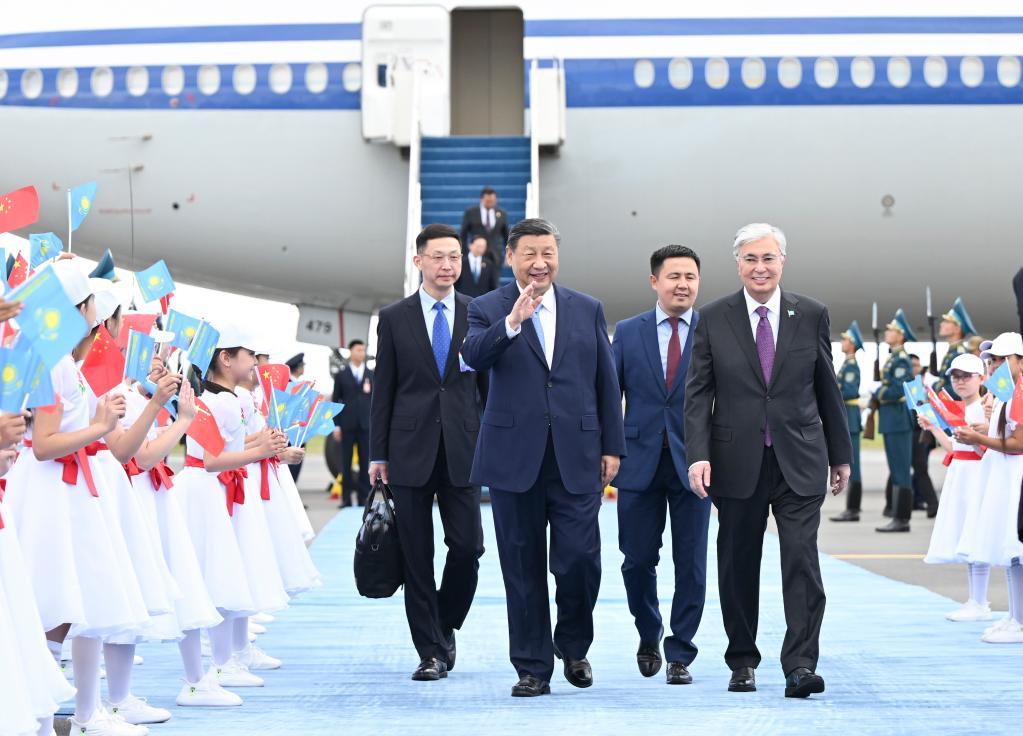
Chinese President Xi Jinping arrives in Astana, Kazakhstan, July 2, 2024, for the 24th Meeting of the Council of Heads of State of the Shanghai Cooperation Organization, and a state visit to Kazakhstan at the invitation of Kazakh President Kassym-Jomart Tokayev. Tokayev held a grand welcoming ceremony at the airport to welcome Xi. (Xinhua/Xie Huanchi)
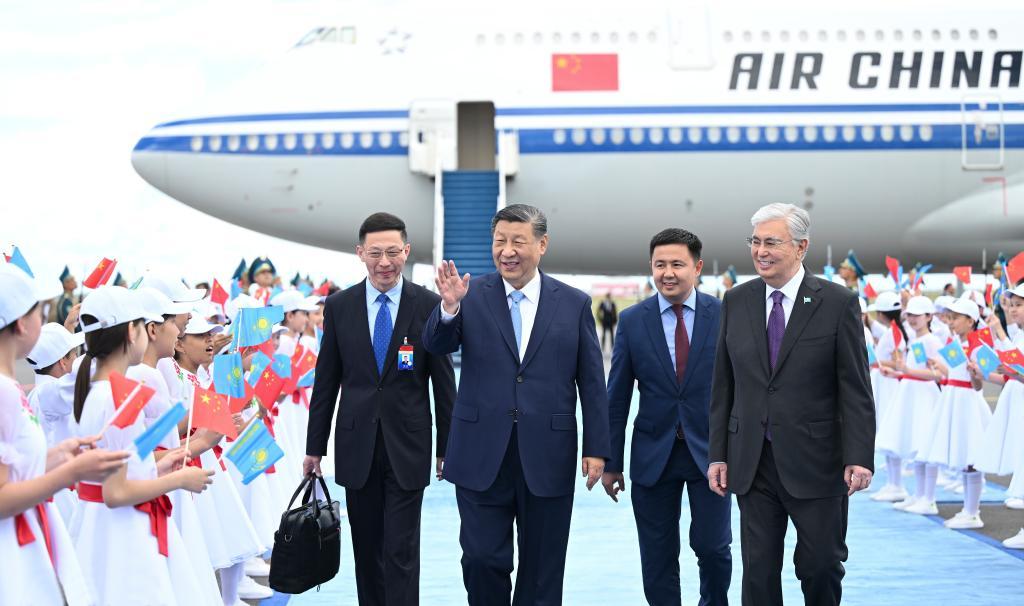
Chinese President Xi Jinping arrives in Astana, Kazakhstan, July 2, 2024, for the 24th Meeting of the Council of Heads of State of the Shanghai Cooperation Organization, and a state visit to Kazakhstan at the invitation of Kazakh President Kassym-Jomart Tokayev. Tokayev held a grand welcoming ceremony at the airport to welcome Xi. (Xinhua/Xie Huanchi)
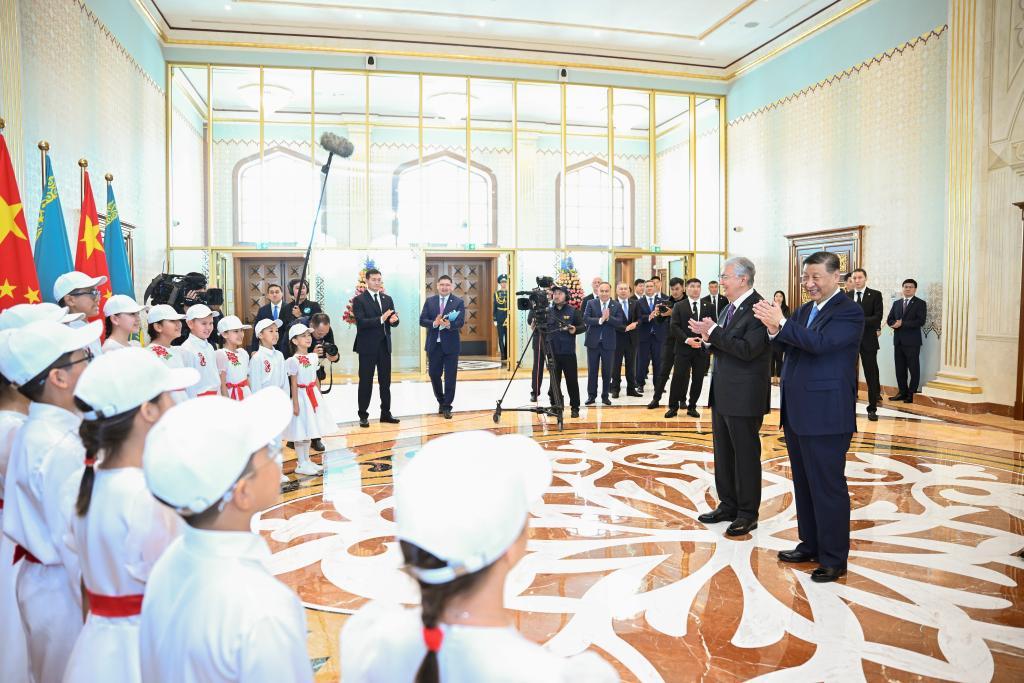
Chinese President Xi Jinping arrives in Astana, Kazakhstan, July 2, 2024, for the 24th Meeting of the Council of Heads of State of the Shanghai Cooperation Organization, and a state visit to Kazakhstan at the invitation of Kazakh President Kassym-Jomart Tokayev. Tokayev held a grand welcoming ceremony at the airport to welcome Xi. A group of Kazakh children sang the song "Ode to the Motherland" in Chinese. (Xinhua/Xie Huanchi)

